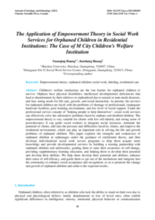Abstract:
Children's welfare institutions are the last barrier for orphaned children to survive. Orphans have physical disabilities, intellectual developmental deficiencies that lead to abandonment by their relatives or orphanhood due to natural or man-made disasters, and face strong needs for life care, growth, and social interaction. At present, the services for orphaned children are faced with the problems of shortage of professionals, inadequate hardware facilities, poor learning environment, and low level of social support. Under the professional service concept of "helping people to help themselves", social work services can effectively solve the substantive problems faced by orphans and disabled children.
The empowerment theory is very suitable for clients with low self-identity and strong sense of powerlessness. It can guide social workers to integrate social resources, stimulate the potential of clients, alleviate the pressure and difficulties faced by clients, and improve the residential environment, which can play an important role in solving the life and growth problems of orphaned children.
This paper explores the strengths and weaknesses of orphaned children in orphanages under the guidance of enrichment theory, and then develops individualized social work service programs to help them acquire more knowledge and provide developmental services by building a trusting partnership with orphaned children and adolescents, guiding them to raise their awareness of self-change, providing supplementary learning education, and helping them to develop their potential and develop their abilities.
The authors help them develop their potential and abilities, enhance their sense of self-efficacy, and guide them to get out of the institutions and integrate into the community to enhance social acceptance and recognition, so as to promote the change and growth of orphaned children and achieve the expected results.

